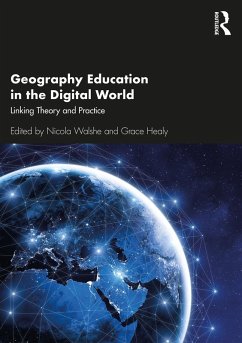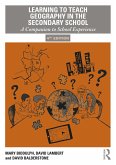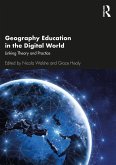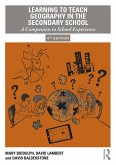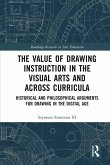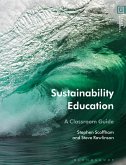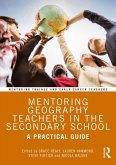Geography Education in the Digital World (eBook, PDF)
Linking Theory and Practice
Redaktion: Walshe, Nicola; Healy, Grace
28,95 €
28,95 €
inkl. MwSt.
Sofort per Download lieferbar

14 °P sammeln
28,95 €
Als Download kaufen

28,95 €
inkl. MwSt.
Sofort per Download lieferbar

14 °P sammeln
Jetzt verschenken
Alle Infos zum eBook verschenken
28,95 €
inkl. MwSt.
Sofort per Download lieferbar
Alle Infos zum eBook verschenken

14 °P sammeln
Geography Education in the Digital World (eBook, PDF)
Linking Theory and Practice
Redaktion: Walshe, Nicola; Healy, Grace
- Format: PDF
- Merkliste
- Auf die Merkliste
- Bewerten Bewerten
- Teilen
- Produkt teilen
- Produkterinnerung
- Produkterinnerung

Bitte loggen Sie sich zunächst in Ihr Kundenkonto ein oder registrieren Sie sich bei
bücher.de, um das eBook-Abo tolino select nutzen zu können.
Hier können Sie sich einloggen
Hier können Sie sich einloggen
Sie sind bereits eingeloggt. Klicken Sie auf 2. tolino select Abo, um fortzufahren.

Bitte loggen Sie sich zunächst in Ihr Kundenkonto ein oder registrieren Sie sich bei bücher.de, um das eBook-Abo tolino select nutzen zu können.
This book draws on theory and practice to provide a critical exploration of the role and practice of geography education within the digital world. It considers how living within a digital world influences teacher identity and professionalism and is changing young people's lives.
- Geräte: PC
- ohne Kopierschutz
- eBook Hilfe
- Größe: 5.69MB
Andere Kunden interessierten sich auch für
![Learning to Teach Geography in the Secondary School (eBook, PDF) Learning to Teach Geography in the Secondary School (eBook, PDF)]() Mary BiddulphLearning to Teach Geography in the Secondary School (eBook, PDF)31,95 €
Mary BiddulphLearning to Teach Geography in the Secondary School (eBook, PDF)31,95 €![Geography Education in the Digital World (eBook, ePUB) Geography Education in the Digital World (eBook, ePUB)]() Geography Education in the Digital World (eBook, ePUB)28,95 €
Geography Education in the Digital World (eBook, ePUB)28,95 €![Learning to Teach Geography in the Secondary School (eBook, ePUB) Learning to Teach Geography in the Secondary School (eBook, ePUB)]() Mary BiddulphLearning to Teach Geography in the Secondary School (eBook, ePUB)31,95 €
Mary BiddulphLearning to Teach Geography in the Secondary School (eBook, ePUB)31,95 €![Thinking Geographically (eBook, PDF) Thinking Geographically (eBook, PDF)]() Alaric MaudeThinking Geographically (eBook, PDF)38,95 €
Alaric MaudeThinking Geographically (eBook, PDF)38,95 €![The Value of Drawing Instruction in the Visual Arts and Across Curricula (eBook, PDF) The Value of Drawing Instruction in the Visual Arts and Across Curricula (eBook, PDF)]() Seymour Simmons IIIThe Value of Drawing Instruction in the Visual Arts and Across Curricula (eBook, PDF)40,95 €
Seymour Simmons IIIThe Value of Drawing Instruction in the Visual Arts and Across Curricula (eBook, PDF)40,95 €![Sustainability Education (eBook, PDF) Sustainability Education (eBook, PDF)]() Stephen ScoffhamSustainability Education (eBook, PDF)19,95 €
Stephen ScoffhamSustainability Education (eBook, PDF)19,95 €![Mentoring Geography Teachers in the Secondary School (eBook, PDF) Mentoring Geography Teachers in the Secondary School (eBook, PDF)]() Mentoring Geography Teachers in the Secondary School (eBook, PDF)29,95 €
Mentoring Geography Teachers in the Secondary School (eBook, PDF)29,95 €-
-
-
This book draws on theory and practice to provide a critical exploration of the role and practice of geography education within the digital world. It considers how living within a digital world influences teacher identity and professionalism and is changing young people's lives.
Dieser Download kann aus rechtlichen Gründen nur mit Rechnungsadresse in A, B, BG, CY, CZ, D, DK, EW, E, FIN, F, GR, HR, H, IRL, I, LT, L, LR, M, NL, PL, P, R, S, SLO, SK ausgeliefert werden.
Produktdetails
- Produktdetails
- Verlag: Taylor & Francis eBooks
- Seitenzahl: 212
- Altersempfehlung: ab 12 Jahre
- Erscheinungstermin: 7. Oktober 2020
- Englisch
- ISBN-13: 9781000196641
- Artikelnr.: 59981860
- Verlag: Taylor & Francis eBooks
- Seitenzahl: 212
- Altersempfehlung: ab 12 Jahre
- Erscheinungstermin: 7. Oktober 2020
- Englisch
- ISBN-13: 9781000196641
- Artikelnr.: 59981860
- Herstellerkennzeichnung Die Herstellerinformationen sind derzeit nicht verfügbar.
Nicola Walshe is Head of the School of Education and Social Care at Anglia Ruskin University. Grace Healy is the Curriculum Director at David Ross Education Trust.
List of Illustrations
Foreword
David Lambert
Acknowledgments
List of Contributors
1. Introduction: navigating the digital world as geographers and geography
educators
Nicola Walshe and Grace Healy
Part I: Professional practice and personal identities in the digital world
2. Teacher identity, professional practice and online social spaces
Clare Brooks
3. Digital technologies and their roles in knowledge recontextualisation
and curriculum making
Steve Puttick
4. Navigating the theory-practice divide: developing trainee teacher
pedagogical content knowledge through 360-degree immersive experiences
Nicola Walshe, Paul Driver and Mandy-Jane Keenoy
5. Children, childhood and children's geographies: evolving through
technology
Lauren Hammond
Part II: Geographical sources and connections in the digital world
6. Geographical sources in the digital world: disinformation,
representation and reliability
Margaret Roberts
7. 'Connecting the Classroom': teaching geographies of development via
digital interactive spaces
Rory Padfield
8. Social media as a tool for geographers and geography educators
Francesca Fearnley
Part III: Geospatial technologies in the digital world
9. Insights from professional discourse on GIS: a case for recognising
geography teachers' repertoire of experience
Grace Healy
10. Empowering geography teachers and students with geographical knowledge:
epistemic access through GIS
Mary Fargher and Grace Healy
11.GIS for young people's participatory geography
Susan Pike
Part IV: Geographical fieldwork in the digital world
12. Using mobile virtual reality to enhance fieldwork experiences in school
geography
Rebecca Kitchen
13. Teaching and learning geography with mobile technologies and fieldwork
Chew-Hung Chang
14. Augmented reality: opportunities and challenges
Gary Priestnall
15. Location-based games for geography and environmental education
Steffen Schaal
Part V: Conclusion
16. From the digital world to the post-digital world: the future generation
of geographers
Grace Healy and Nicola Walshe
Foreword
David Lambert
Acknowledgments
List of Contributors
1. Introduction: navigating the digital world as geographers and geography
educators
Nicola Walshe and Grace Healy
Part I: Professional practice and personal identities in the digital world
2. Teacher identity, professional practice and online social spaces
Clare Brooks
3. Digital technologies and their roles in knowledge recontextualisation
and curriculum making
Steve Puttick
4. Navigating the theory-practice divide: developing trainee teacher
pedagogical content knowledge through 360-degree immersive experiences
Nicola Walshe, Paul Driver and Mandy-Jane Keenoy
5. Children, childhood and children's geographies: evolving through
technology
Lauren Hammond
Part II: Geographical sources and connections in the digital world
6. Geographical sources in the digital world: disinformation,
representation and reliability
Margaret Roberts
7. 'Connecting the Classroom': teaching geographies of development via
digital interactive spaces
Rory Padfield
8. Social media as a tool for geographers and geography educators
Francesca Fearnley
Part III: Geospatial technologies in the digital world
9. Insights from professional discourse on GIS: a case for recognising
geography teachers' repertoire of experience
Grace Healy
10. Empowering geography teachers and students with geographical knowledge:
epistemic access through GIS
Mary Fargher and Grace Healy
11.GIS for young people's participatory geography
Susan Pike
Part IV: Geographical fieldwork in the digital world
12. Using mobile virtual reality to enhance fieldwork experiences in school
geography
Rebecca Kitchen
13. Teaching and learning geography with mobile technologies and fieldwork
Chew-Hung Chang
14. Augmented reality: opportunities and challenges
Gary Priestnall
15. Location-based games for geography and environmental education
Steffen Schaal
Part V: Conclusion
16. From the digital world to the post-digital world: the future generation
of geographers
Grace Healy and Nicola Walshe
List of Illustrations
Foreword
David Lambert
Acknowledgments
List of Contributors
1. Introduction: navigating the digital world as geographers and geography
educators
Nicola Walshe and Grace Healy
Part I: Professional practice and personal identities in the digital world
2. Teacher identity, professional practice and online social spaces
Clare Brooks
3. Digital technologies and their roles in knowledge recontextualisation
and curriculum making
Steve Puttick
4. Navigating the theory-practice divide: developing trainee teacher
pedagogical content knowledge through 360-degree immersive experiences
Nicola Walshe, Paul Driver and Mandy-Jane Keenoy
5. Children, childhood and children's geographies: evolving through
technology
Lauren Hammond
Part II: Geographical sources and connections in the digital world
6. Geographical sources in the digital world: disinformation,
representation and reliability
Margaret Roberts
7. 'Connecting the Classroom': teaching geographies of development via
digital interactive spaces
Rory Padfield
8. Social media as a tool for geographers and geography educators
Francesca Fearnley
Part III: Geospatial technologies in the digital world
9. Insights from professional discourse on GIS: a case for recognising
geography teachers' repertoire of experience
Grace Healy
10. Empowering geography teachers and students with geographical knowledge:
epistemic access through GIS
Mary Fargher and Grace Healy
11.GIS for young people's participatory geography
Susan Pike
Part IV: Geographical fieldwork in the digital world
12. Using mobile virtual reality to enhance fieldwork experiences in school
geography
Rebecca Kitchen
13. Teaching and learning geography with mobile technologies and fieldwork
Chew-Hung Chang
14. Augmented reality: opportunities and challenges
Gary Priestnall
15. Location-based games for geography and environmental education
Steffen Schaal
Part V: Conclusion
16. From the digital world to the post-digital world: the future generation
of geographers
Grace Healy and Nicola Walshe
Foreword
David Lambert
Acknowledgments
List of Contributors
1. Introduction: navigating the digital world as geographers and geography
educators
Nicola Walshe and Grace Healy
Part I: Professional practice and personal identities in the digital world
2. Teacher identity, professional practice and online social spaces
Clare Brooks
3. Digital technologies and their roles in knowledge recontextualisation
and curriculum making
Steve Puttick
4. Navigating the theory-practice divide: developing trainee teacher
pedagogical content knowledge through 360-degree immersive experiences
Nicola Walshe, Paul Driver and Mandy-Jane Keenoy
5. Children, childhood and children's geographies: evolving through
technology
Lauren Hammond
Part II: Geographical sources and connections in the digital world
6. Geographical sources in the digital world: disinformation,
representation and reliability
Margaret Roberts
7. 'Connecting the Classroom': teaching geographies of development via
digital interactive spaces
Rory Padfield
8. Social media as a tool for geographers and geography educators
Francesca Fearnley
Part III: Geospatial technologies in the digital world
9. Insights from professional discourse on GIS: a case for recognising
geography teachers' repertoire of experience
Grace Healy
10. Empowering geography teachers and students with geographical knowledge:
epistemic access through GIS
Mary Fargher and Grace Healy
11.GIS for young people's participatory geography
Susan Pike
Part IV: Geographical fieldwork in the digital world
12. Using mobile virtual reality to enhance fieldwork experiences in school
geography
Rebecca Kitchen
13. Teaching and learning geography with mobile technologies and fieldwork
Chew-Hung Chang
14. Augmented reality: opportunities and challenges
Gary Priestnall
15. Location-based games for geography and environmental education
Steffen Schaal
Part V: Conclusion
16. From the digital world to the post-digital world: the future generation
of geographers
Grace Healy and Nicola Walshe
